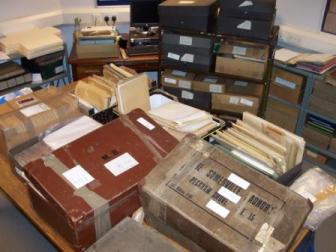The first few months of every calendar year mean one thing to colleagues in my department: it’s “Accessions” time!

Newly accessioned records: this is where the archivists’ work begins (image courtesy of Warwickshire County Record Office)
Accessions to Repositories is an annual survey we run to map and record what archives all over the country have collected in the previous calendar year. We survey over 300 archives which are actively building their collections, so it’s a major piece of work.
At the end of each year’s project, we publish survey highlights on the website, including themed digests for different subjects, from modern politics to garden history and the history of London. But most of the work goes on behind the scenes, using this information to update the National Register of Archives, and that’s happening right now. The Register already contains information on the surviving archives of 221,140 different families, organisations, people and businesses*. It’s the headline information source for where archives are held across the UK. Where possible it gives you links to more detailed information about archive holdings.
This annual accessions survey means we can quickly share new collections information that covers archives right across the nation. New collections in archives always mean new possibilities for researchers, and it’s an exciting experience to be part of. Accessioning collections is just the start of making archives available: they will usually need to be repackaged, cleaned, arranged and catalogued before the collection is ready for researchers. But it’s always good to know what is coming up.
Whether it’s the romance-lover’s dream that Reading University Special Collections have accessioned the archives of the publishers Harlequin Mills & Boon, or news to delight my dad that Surrey History Centre have acquired the archives of Airfix Ltd, it’s a reminder that archives have something to offer everyone.
Whose collection would you most like to find in an archive?
* When I checked for this post. It will be higher by the time it goes live!
A fantastic resource! It’s great to be able to find new resources so easily. We also highlight new accessions on our twitter site @heritagewshc and also with our blogs at http://www.wshc.eu/blog
Thanks! We’re just developing a new webpage for the wider sector to highlight relevant blogs – I’ve already got Wilts Heritage down as one to link to, so I hope you’ll get some new followers and researchers that way.
I would very much like to hear about the challenges that Special Collections’ face in diogtizatiin. In what ways might scholars work with Special Collections to facilitate funding for diogtizatiin and identify possible larger dh projects for Special Collections to participate in? It strikes me that scholars at universities who use their own Special Collections are often not in touch with one another and don’t act as a community in working with Special Collections in regard to diogtizatiin projects and possibilites.
Thanks for your interesting reflection. Joining up resources between academics and information professionals is a really important part of the work of our Research team at The National Archives. It is also the subject of a project underway right now at Research Libraries UK on ‘unique and distinctive collections’ (http://www.rluk.ac.uk/content/unique-and-distinctive-collections). Their work may be of interest, particularly when the project reports with recommendations for the future.